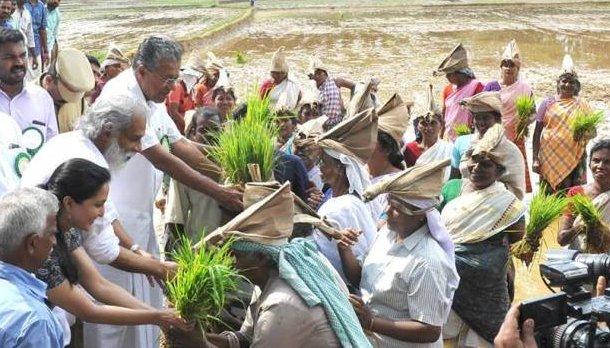Kerala Announces Labour Policy; Minimum Wage to be Rs 600 per day

Pinarayi Vijayan with Agricultural Workers
The Left Democratic Front (LDF) government of Kerala has announced its Draft Labour Policy. Chief Minister Pinarayi Vijayan said in a statement on Thursday that the policy seeks to ensure the welfare and social security of workers along with the comprehensive development of Kerala’s economy and society.
Wages
Kerala is the state with the highest wage rates in India, owing primarily to workers in most sectors being organised into trade unions. Unlike most other states where minimum wage laws remain merely on paper, most workers in Kerala earn more than the minimum wage.
The State’s new labour policy seeks to raise minimum wages to Rs. 600 per day. Apart from ensuring minimum wages in all branches of work which fall under the Minimum Wages Act, at least a basic wage will be ensured in the branches of work which don’t fall under the Act. ‘Fair wages’ will be implemented in sectors where there are possibilities of ensuring higher remuneration. A revenue recovery system would be implemented in order to recover wage arrears, if any, from the employers.
Appropriate legislation will be brought in to regulate the work and pay conditions of teaching and non-teaching staff in un-aided educational institutions which currently do not benefit from the protection of labour laws.
Social Security
Kerala is the State in India with the most wide-ranging set of social security schemes for workers. The new labour policy aims to strengthen the various Workers’ Welfare Fund Boards in the State. The welfare schemes would be revamped in a manner such that administrative costs are reduced and benefits such as health and housing are ensured.
Industrial Relations and Collective Bargaining
The work of Industrial Relations Committees would be extended to sectors such as agriculture, Information Technology and fish processing which do not have such committees currently.
A labour bank will be created for the protection and job security of domestic workers.
The Recognition of Trade Union Act (2010) will be strictly implemented in all sectors in order to strengthen collective bargaining and to make it transparent.
Unorganised Sector and Enforcement of Labour Laws
The labour policy aims to strengthen and reinvigorate the work of the Labour Department’s Enforcement section to improve the work and pay conditions of unorganised workers in shops and commercial establishments.
Labour-friendly enterprises will be identified on the basis of the evaluation of the Labour Intelligence Cell, which is to be newly established.
Women-friendly Workplaces
The policy says that steps would be taken to ensure gender equality and to create woman-friendly environment in workplaces. Maternity benefits and facilities for breastfeeding children in workplaces will be ensured. Maternity leave will be ensured with pay, as per the provisions of the Maternity Benefit Act.
Crèche facilities will be set up wherever possible, with the help of the Social Justice Department. A crèche cess will be introduced. Arrangements to ensure the periodic maintenance of crèche facilities will be made compulsory.
The policy says that the government will intervene to ensure overtime allowance, weekly off, break time, and arrangements for accommodation and transport for women workers, depending on the nature of the enterprises.
Toilets and rooms for workers to take rest will be made compulsory as per labour law.
Seating arrangements for workers will be made compulsory. This assumes significance especially because instances of workers not being allowed to sit during work had come to light in the recent years. The women workers of Kalyan Silks, a major chain of textile showrooms in Kerala, had gone on strike in 2014-15 to win the right to sit during working hours.
The policy says that the Kerala Industrial Establishments (National and Festival Holidays) Act will be amended to ensure that workers in all establishments get days off on four national holidays and on polling days for general elections.
Migrant Workers
Some of the most noteworthy provisions of the labour policy relate to the LDF government’s approach towards migrant workers in the State. Kerala had launched India’s first welfare scheme for migrant workers in 2010, and recently it had earned widespread praise for Awaz, the new health insurance scheme for migrant workers. The new labour policy seeks to extend these advances further.
Language-wise details of workers from other States who work in Kerala would be collected, and volunteers with knowledge of the respective languages will be deputed to communicate with the workers.
Facilitation centres will be set up in various parts of the State where workers from other States can access information about their rights, various welfare schemes, rail and road transport facilities, government services etc.
The Apna Ghar scheme to provide livable accommodation facilities for migrant workers from other States would be extended to all over Kerala.
Mobile app will be used to set up a facility to find unregistered workers and to get them to register for the Health Insurance Scheme.
Plantation Workers
Improving the living conditions of plantation workers in Kerala was one of the major promises of the LDF during its election campaign in 2016, especially in districts such as Wayanad with a high percentage of farmers and agricultural workers in the plantation sector.
The new labour policy promises to implement a scheme to improve the quality of garden hospitals and group hospitals for plantation workers, as well as the educational facilities for plantation workers’ children. Workers’ quarters in plantations will be renovated.
Comprehensive Health Insurance coverage will be ensured for plantation workers’ families.
A scheme will be implemented so that plantation workers who don’t have houses on their one can have their own houses. Those who don’t have land and housing will be provided with the same, and steps will be taken to improve wages and other benefits.
Traditional Industries
Workers in many traditional industries have been for long faced with the problem of not getting work throughout the year. The labour policy seeks to explore all possibilities of increasing the number of working days in such industries. The Labour Department will formulate schemes as necessary, with the cooperation of other departments.
A scheme will be formulated in association with the Industries Department, for the sustenance of traditional industries and for the renovation of industries which are in crisis.
The Income Support Scheme for workers in traditional industries will be revamped and implemented.
Traditional industries will be modernised suitably and productivity shall be improved in accordance with changes in technology and production processes.
Employees’ State Insurance
The Employees’ State Insurance (ESI) Scheme will be expanded. ESI Dispensaries and Hospitals will be renovated. New ESI dispensaries will be started in places where they don’t exist.
Steps will be taken to get ISO certification for the 9 ESI Hospitals in the State. ESI Hospitals in Feroke (Kozhikode district) and Thottada (Kannur district) would be upgraded to the status of Super Speciality Hospitals.
Skill Development
The Mid-Day Meal Scheme will be extended to all Industrial Training Institutes (ITIs) in stages. Smart Class Room, Virtual Class Room and other new technologies will be used to raise ITIs to international standards.
Special skill development programmes will be implemented for women and those belonging to deprived communities.
Ensuring job security, decent remuneration and social security for workers in all sectors is the overarching objective that the LDF government has set for itself while announcing the Draft Labour Policy.
Get the latest reports & analysis with people's perspective on Protests, movements & deep analytical videos, discussions of the current affairs in your Telegram app. Subscribe to NewsClick's Telegram channel & get Real-Time updates on stories, as they get published on our website.
























